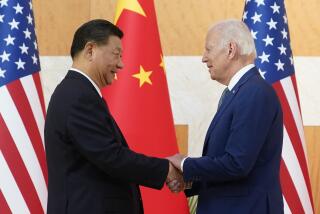N. Korea Peeks Over the Wall
- Share via
The secrecy was typical, but the occasion was exceptional. For three days last week North Korea’s reclusive leader Kim Jong Il visited China, his first foreign trip in 17 years and a further sign that North Korea is interested in ending its international isolation. The visit wasn’t announced until it was over, and care was taken to keep Kim out of public view. But afterward the Chinese briefed South Korea’s ambassador to Beijing about Kim’s talks with President Jiang Zemin, including the confidence that Kim, previously known to have a fondness for the bottle, now drinks “only a little wine.” Kim the playboy is now presented as having evolved into Kim the mature and responsible leader.
Whether there are indeed a new Kim and a changing North Korea should become clearer later this month, when Kim is scheduled to host South Korea’s President Kim Dae Jung in Pyongyang. Leaders of the two countries have never met. The outward signs indicate the talks will be heavy on atmospherics and light on results. No agenda could be agreed on, so the issues Seoul has been keenly interested in--arranging meetings between families separated by the Korean War 50 years ago and starting postal service across the demilitarized zone--are unlikely to be resolved. Kim Dae Jung instead seems content just to break the ice in what has been a perpetually frozen relationship.
That doesn’t mean there will be only chitchat. Pyongyang excels at the politics of extortion. It has extracted billions in food and energy aid from the United States by implicitly threatening to build nuclear weapons and long-range missiles. It certainly hopes to wring more aid out of South Korea. Seoul isn’t unwilling. While its first concern is that North Korea could reopen the Korean War, its second is that the impoverished and famine-stricken country might suddenly collapse, leaving South Korea with the staggering burden of succoring an additional 22 million Koreans. Seoul instead hopes that the North can be eased toward what it calls a soft landing, by encouraging its economic liberalization and development.
In his Beijing visit Kim Jong Il was shown some of the impressive economic gains made by China since its shift toward a market economy. The message wasn’t subtle. Pyongyang may finally be waking up to the fact that the world has passed it by. If it wants to play catch-up, it’s going to have to put aside its sterile ideology and adopt some unprecedented and wrenching reforms.
More to Read
Sign up for Essential California
The most important California stories and recommendations in your inbox every morning.
You may occasionally receive promotional content from the Los Angeles Times.













